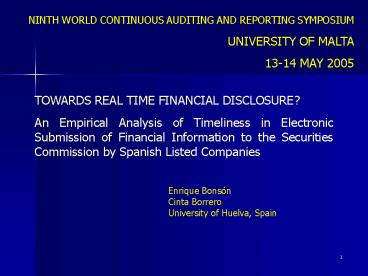Presentacin de PowerPoint - PowerPoint PPT Presentation
1 / 26
Title:
Presentacin de PowerPoint
Description:
An Empirical Analysis of Timeliness in Electronic Submission of ... JUSTIFICATION: To reduce the period of time established for submission. 4. INTRODUCTION (II) ... – PowerPoint PPT presentation
Number of Views:30
Avg rating:3.0/5.0
Title: Presentacin de PowerPoint
1
NINTH WORLD CONTINUOUS AUDITING AND REPORTING
SYMPOSIUM UNIVERSITY OF MALTA 13-14 MAY 2005
TOWARDS REAL TIME FINANCIAL DISCLOSURE? An
Empirical Analysis of Timeliness in Electronic
Submission of Financial Information to the
Securities Commission by Spanish Listed Companies
Enrique Bonsón Cinta Borrero University of
Huelva, Spain
2
INDEX
- INTRODUCTION
- HIPOTHESES AND METHODOLOGY
- DESCRIPTIVE STATISTICS
- CONTRAST OF HIPOTHESES
- CONCLUSIONS
3
INTRODUCTION (I)
OBJECTIVES To study the delays in the
submission of financial information to the
Spanish Securities Commission (SSC) To identify
the factors influencing timeliness on financial
information submission JUSTIFICATION To reduce
the period of time established for submission.
4
INTRODUCTION (II)
- PERIOD OF SUBMISSION
- The SSC Regulation of January 18, 1991
established the following periods for submission - 1st quarter from 01/04 to 16/05 (46 days)
- 1st semester from 01/07 to 01/09 (62 days)
- 3rd quarter from 01/10 to 16/11(47 days)
- 2nd semester from 01/01 to 01/03 (59 days)
5
INTRODUCTION (III)
- DIGITAL SUBMISSION OF INFORMATION
- SSC Regulation 3/1994 (June, 8) possibility to
voluntarily submit information in a digital form - SSC Regulation 2/2002 (November, 27) Digital
submission was made compulsory CIFRADOC (XML) - SSC Regulation 1/2005 (April 1) new formats for
financial statements according to IAS. To be
implemented in XBRL. - A missed oportunity to shorten submission periods.
6
INTRODUCTION (IV)
IMPACT ON DIGITAL INFORMATION AVAILABLE
- Before Regulation 2/2002 only 30 of Spanish
listed companies. - After Regulation 2/2002 The information
available increases considerably. More than 90
of Spanish listed companies
7
INDEX
- INTRODUCTION
- HIPOTHESES AND METHODOLOGY
- DESCRIPTIVE STATISTICS
- CONTRAST OF HIPOTHESES
- CONCLUSIONS
8
HIPOTHESES AND METHODOLOGY (I)
SAMPLE Spanish continuous market, 136
companies. EXTENT 2º Semester 2002 to 2º
Semester 2004.
9
HIPOTHESES AND METHODOLOGY (II)
- DEPENDENT VARIABLE
- Period of Submission
- INDEPENDENT VARIABLES
- Sector
- Capitalization
- Departures from the audit standard report
- Visibility (For the year 2004 only)
- Quotation abroad
- Age of the company
- Bad news
10
HIPOTHESES AND METHODOLOGY (III)
- Sector In this study we have considered 7
sectors investment goods, communications,
consumption, construction, energy, financial
services, market services. - Size logarithm of capitalization of the company
- Departures from the audit standard report (1
yes, 0 no)
11
HIPOTHESES AND METHODOLOGY (IV)
- Visibility Measured by the number of documents,
talking about one particular company, which
appear on the Internet. - Quotation abroad 1 for companies listed in a
foreign stock exchange, 0 otherwise. - Age of the company years since the company
entered in the stock exchange, 1 if age is lt 6
years (young company), 0 otherwise. - Bad news 1 if current year profit is lower than
previous year profit, 0 otherwise.
12
HIPOTHESES AND METHODOLOGY (V)
- The submission period is shorter
- H1 Depending on the economic sector the company
belongs to - H2 For bigger companies
- H3 For companies which do not have departures
from the audit standard report - H4 For companies with more visibility.
- H5 For companies that are listed abroad
- H6 For younger companies
- H7 For companies without bad news.
13
INDEX
- INTRODUCTION
- HIPOTHESES AND METHODOLOGY
- DESCRIPTIVE STATISTICS
- CONTRAST OF HIPOTHESES
- CONCLUSIONS
14
DESCRIPTIVE STATISTICS
15
DESCRIPTIVE STATISTICS
Sectors
16
DESCRIPTIVE STATISTICS
TATABLE. INTERMEDIATE FINACIAL INFORMATION
17
INDEX
- INTRODUCTION
- HIPOTHESES AND METHODOLOGY
- DESCRIPTIVE STATISTICS
- CONTRAST OF HIPOTHESES
- CONCLUSIONS
18
CONTRAST OF HIPOTHESES 2002
Coefficients (a)
a Dependent Variable 2º SEMESTER 2002
19
CONTRAST OF HIPOTHESES 2002
Summary of model
a Significant Variable (Constant), LOG.
CAPITALIZ.
20
CONTRAST OF HIPOTHESES 2003
Coefficients (a)
a Dependent variable 2º SEMESTER 2003
21
CONTRAST OF HIPOTHESES 2003
Summary of model
a Sifnificant variable (Constant), FIN_SERV b
Sifnificant variable (Constant), FIN_SERV,
ENERGY
22
CONTRAST OF HIPOTHESES 2004
Coefficients (a)
a Variable dependiente 2º SEMESTRE 04
a Dependent Variable 2º SEMESTER 2004
23
CONTRAST OF HIPOTHESES 2004
Summary of model
a Sifnificant variable (Constant), FIN_SER b
Sifnificant variable (Constant), FIN_SER,
ENERGY
24
INDEX
- INTRODUCTION
- HIPOTHESES AND METHODOLOGY
- DESCRIPTIVE STATISTICS
- CONTRAST OF HIPOTHESES
- CONCLUSIONS
25
- CONCLUSIONS
- Companies which belong to the financial services
sector submit earlier. - Companies which belong to the energy sector also
submit earlier. - Why?
- Because these sectors are internally regulated by
the Bank of Spain and The National Commission of
Energy
26
- CONCLUSIONS (II)
- Submission periods for
- Non audited information39,3 days
- Audited information 55.8 days
- Where is the bottleneck? Traditional auditing? Is
CA the solution? - Should the SSC establish shorter submission
periods 30 days for quarterly information and 45
for anual and half year reports?































